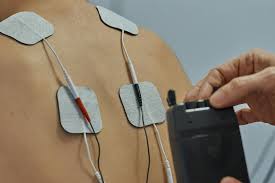
Transcutaneous electrical nerve stimulation (TENS) is the use of electric current produced by a device to stimulate the nerves for therapeutic purposes.
TENS, by definition, covers the complete range of transcutaneously applied currents used for nerve excitation.
TENS term is often used with a more restrictive intent, namely to describe the kind of pulses produced by portable stimulators used to reduce pain.
The TENS unit is usually connected to the skin using two or more electrodes which are typically conductive gel pads.
The TENS unit is able to modulate pulse width, frequency, and intensity.
TENS is applied at high frequency (>50 Hz) with an intensity below motor contraction or low frequency (<10 Hz) with an intensity that produces motor contraction.
Intensity of stimulation should be strong but comfortable with greater intensities, regardless of frequency, producing the greatest analgesia.
Transcutaneous electrical nerve stimulation is a commonly used to alleviate acute and chronic pain by reducing the sensitization of dorsal horn neurons, elevating levels of gamma-aminobutyric acid and glycine, and inhibiting glial activation.
Trials looking at the effectiveness of using TENS to reduce different sources of pain have been inconclusive due to a lack of high quality and unbiased evidence.
Potential benefits of TENS treatment:
safety, relative low cost, the ability to self-administer, and availability without a prescription.
Adequate intensity of stimulation is necessary to achieve pain relief with TENS.
For recent onset pain of less than three months, such as pain associated with surgery, trauma, and/or medical procedures, TENS may be better than placebo in some cases, however the evidence of benefit is very weak.
There is an absence of high-quality evidence of the analgesic benefit of TENS devices for chronic or neuropathic pain.
Any pain relief disappears as soon as the TENS unit is turned off.
Results from a task force on neck pain found no clinically significant benefit to TENS for the treatment of neck pain when compared to a placebo treatment.
A review did not find evidence to support the use of TENS for chronic low back pain.
A study examining knee osteoarthritis supported that TENS demonstrated a better efficacy and safety profile than weak opiates.
There is tentative evidence that it may be useful for painful diabetic neuropathy.
A few studies have objective evidence that TENS may modulate or suppress pain signals in the brain, as seen by fMRI analysis: carpal tunnel and shoulder impingement pain.
TENS may be effective for relieving labor pain.
There is a significant change in how soon the laboring mothers took to request pharmacologic pain management, as a group with TENS waited five additional hours.
TENS may be helpful for treating pain from dysmenorrhoea.
Percutaneous and transcutaneous electrical nerve stimulation in the tibial nerve have been used in the treatment of overactive bladder and urinary retention.
A major trial found that in a care home context transcutaneous posterior tibial nerve stimulation did not improve urinary incontinence.
A wearable neuromodulation device that delivers electrical stimulation to nerves in the wrist acts as a non-invasive treatment for those living with essential tremor.
The stimulator has electrodes that are placed circumferentially around a patient’s wrist.
Reductions in hand tremors were reported following noninvasive median and radial nerve stimulation.
People who have implanted electronic medical devices including pacemakers and cardiodefibrillators are not suggested to use TENS.
Caution should be taken before using TENS in those who are pregnant, have epilepsy, have an active malignancy, have deep vein thrombosis, have skin that is damaged, or are frail.
TENS has been found to be safe compared with pharmaceutical medications for treating pain.
Potential side effects include: skin itching and mild redness of the skin.
Some patients dislike the sensation associated with TENS.
The TENS device acts to stimulate the sensory nerves and a small portion of the peripheral motor nerves.
TENS stimulates competing sensory neurons at the pain perception gate, and it stimulates the opiate response.
TENS has different effects on the brain.
A randomized controlled trial shown that sensory ULF-TENS applied on the skin proximally to trigeminal nerve, reduced the effect of acute mental stress assessed by heart rate variability.
A head-mounted TENS device was effective in preventing migraine attacks in a randomized sham-controlled trial.
Repeated application of TENS can generate analgesic tolerance within five days, reducing its efficacy.
The study noted that TENS causes the release of endogenous opioids, and that the analgesia is likely due to opioid tolerance mechanisms.
The pain reduction ability of TENS is unconfirmed by randomized controlled trials.
A meta-analysis of several hundred TENS studies concluded that there was a significant overall reduction of pain intensity due to TENS, but the the confidence in the results was of low-certainty.
TENS electrodes are contraindicated:
Over the eyes due to the risk of increasing intraocular pressure
Transcerebrally
On the front of the neck due to the risk of an acute hypotension through a vasovagal response or even a laryngospasm.
Through the chest using anterior and posterior electrode positions, or other transthoracic applications.
Internally, except for specific applications of dental, vaginal, and anal stimulation that employ specialized TENS units.
On broken skin areas or wounds, although it can be placed around wounds.
Over a tumor/malignancy as electricity promotes cell growth.
Directly over the spinal column.
TENS used across an artificial cardiac pacemaker may cause interference and failure of the implanted device.
TENS is likely to be less effective on areas of numb skin or decreased sensation due to nerve damage,and may also cause skin irritation due to the inability to feel currents until they are too high.
TENS should also be used with caution in people with epilepsy or pregnant women, as the effects of electrical stimulation over the developing fetus are not known.
